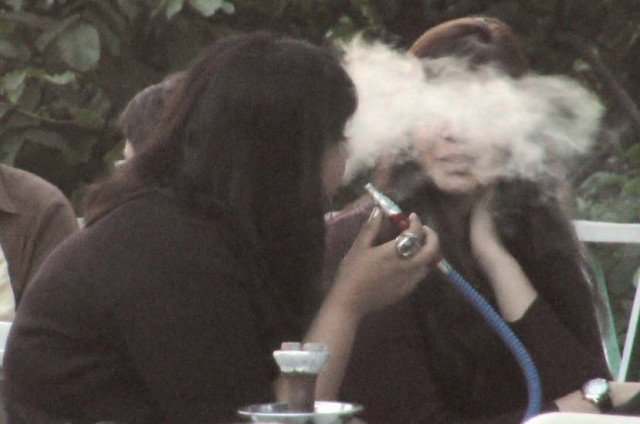Preferring ‘non-flavoured air’, people demand implementation of anti-smoking laws
Hoteliers shift blame on authorities’ leniency; demand; profitability.

Unlike smoke-emitting vehicles and factory fumes, the trend of smoking shisha has made its way up north, “polluting the area’s clean air” as locals put it.
Groups of youngsters, majority of them college and university students, can be seen smoking shisha (water pipe) on balconies and outside hotels in Nathiagali, Ayubia and surrounding areas from midday till late in the night. Not a single hotel or eatery in the area is without the facility and dozens of decorated shishas are displayed to attract customers.
Locals have complained that smoking shisha is fast becoming a trend despite laws prohibiting smoking in public places, (Prohibition of Smoking and Protection of Non-smokers Health Ordinance 2002) and the practice is injurious for their health as well as their children’s. They have urged the concerned authorities to ensure that the law is implemented in letter and spirit.
“Yes I know smoking is injurious to health but the tobacco in shisha is not as harmful,” said Natasha Khan, a student of Peshawar University, who claims that she acquired the habit a year ago from one of her classmates. She tried shisha ‘out of curiosity’. She said she now smokes shisha thrice a day and is a ‘shisha addict.’
Shisha, also known as a hookah or water-pipe, is a traditional method of smoking in the subcontinent and has been prevalent in the hujra culture of Khyber-Pakhtunkhwa for centuries. However, shisha is different from the traditional hookah as instead of plain tobacco it uses flavoured tobacco mixed with aromatic substances. The mixture, available in flavours such as apple, mango, watermelon, strawberry, orange, grape, and mint, weighs around 10 to 20 grammes.
Sardar Sabir, a hotelier in Nathiagali, said that due to the rising demand for shisha, especially among the youth, “We are bound to serve it to them in a comfortable environment to keep our businesses running.” Sabir said he was aware that smoking is prohibited in public places but when the authorities concerned are lenient towards cigarette smokers, how can he stop people from smoking shisha.
A snack bar owner near Harno Picnic Point said customers throng the area during weekends demanding shisha. He serves around 15 to 25 shishas a day, for Rs250 each. Another hotelier said that he serves 10 to 20 shishas daily because every second customer who patronises his hotel asks for one.
Talking to The Express Tribune, medical specialist Dr Ejaz Masood said that a single shisha contains the amount of nicotine and tar present in 20 cigarettes.
He said that use of shisha has serious health consequences especially for the smoker’s lungs and heart. Smoking shisha can cause cancer, asthma attacks and infectious diseases from smokers sharing the pipes. It may also result in low birth weight for babies of smoking mothers.
He said people visit northern areas to enjoy clean air, which serves as a respite from the polluted environment in the cities. “What is the point of visiting this area if the environment is polluted with smoke?” he asked.
Ziafat Zaman, a social activist working against the use of tobacco in Hazara, demanded specific legislation against shisha on the pattern of Sindh.
Published in The Express Tribune, July 9th, 2011.






1733130350-0/Untitled-design-(76)1733130350-0-208x130.webp)












COMMENTS
Comments are moderated and generally will be posted if they are on-topic and not abusive.
For more information, please see our Comments FAQ